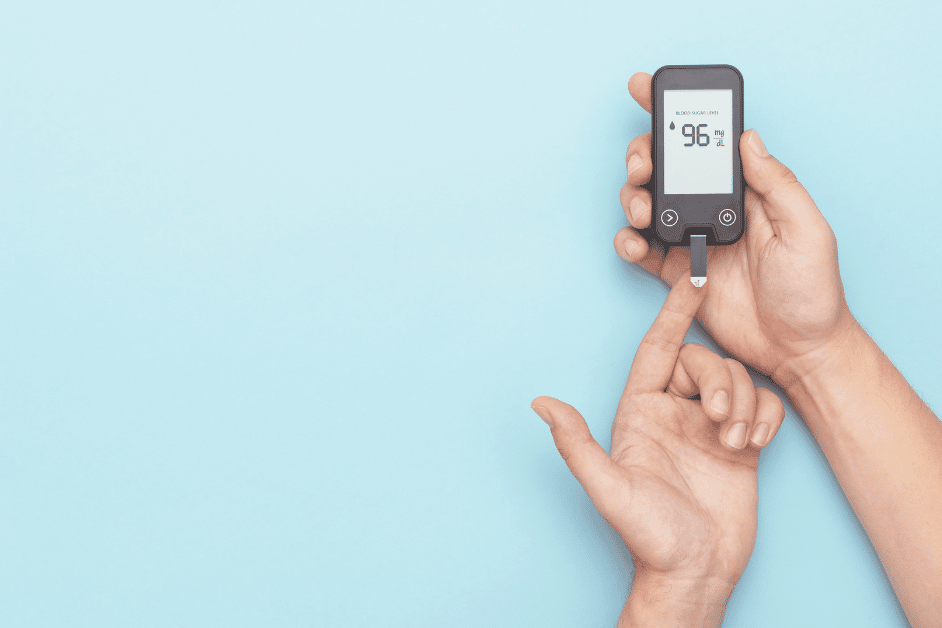Today I’m unpacking a topic that doesn’t get the attention it deserves: sexual wellness during perimenopause. While this is a powerful time in our lives, it can come with a lot of changes that make us feel like those orgasms we once had are now a thing of the past.
What’s worse than searching for our former sensuality is we’re often told by doctors, “That’s common at your age,” and sent on our way without a solution, wishing we hadn’t taken our turn-on for granted.
But here’s the thing: sexual wellness is not a luxury reserved for our younger selves. It’s an essential part of our health and wellbeing in all stages of womanhood: even perimenopause, menopause, and beyond. Pleasure is our birthright, ladies, and together we’re going to reclaim it!
Understanding the Link Between Hormones and Sexual Pleasure
Perimenopause brings a lot of hormonal fluctuations as our bodies prepare for menopause. But there’s more to it than hot flashes and mood swings: hormones like estrogen, progesterone, and testosterone can have a significant impact on our sexual health and intimacy leaving us with reduced sensation, discomfort, or no desire to “do it” in the first place.
If you’re facing any of these challenges, you’re not alone–over 40% of perimenopausal women report sexual dysfunction. And sexual dysfunction isn’t just lacking the drive to get down–it can mean having trouble at any of the four stages of sexual response:
- Desire: Lasting anywhere from minutes to hours, desire is when the body begins to prepare for sexual activity in response to thoughts or sensations by increasing blood flow to the vaginal area.
- Arousal: The Lubrication of the vagina and swelling of the clitoris that began in the Desire stage intensified in the Arousal stage.
- Orgasm: During orgasm, or climax, pelvic muscles contract and tension is released.
- Resolution: This is when muscles begin to relax, heart rate slows, and the body returns to its unaroused state.
The good news? These issues can often be addressed, bringing you back to a place of sexual satisfaction. Before we talk about how to address them, though, let’s take a look at what’s causing these unwanted changes.
Decreased Sensitivity and Sensation
Estrogen plays a vital role in maintaining vaginal lubrication and blood flow. As estrogen levels begin to drop during menopause, women may experience decreased sensitivity and sensation, particularly in the clitoris. This can lead to orgasms that are less intense, more difficult to achieve, or are even non-existent. So if you’re feeling like someone “turned down the volume” on your orgasms or they’re completely MIA, estrogen may be to blame.
Discomfort
Estrogen is also responsible for overall vaginal tissue health. Decreasing estrogen can lead to vaginal atrophy: thinning and inflammation of the vaginal walls, along with vaginal dryness. All of this can contribute to discomfort, irritation, and pain during sex.
Low Sex Drive
We can’t place all the blame on estrogen for trouble in the bedroom, though. Progesterone and testosterone can also start to decline during menopause, bringing your mood and–you guessed it–libido right down with them.
A Holistic Approach to Rediscovering Sexual Pleasure In Perimenopause
So, what can we do to relight the fire and restore intimacy? Here’s where to start:
- Address Hormone Imbalances: Just as I emphasized the significance of hormone balance for skin health, the same applies to your sexual health. Comprehensive hormone testing is key to addressing imbalances. The DUTCH panel can give invaluable insight into your hormone levels and guide a personalized protocol to restore balance.
- Nurture Your Gut: Surprisingly, gut health also impacts sexual health. A healthy gut supports nutrient absorption, including essential vitamins and minerals crucial for hormone production and overall well-being. Prioritize a diverse, nourishing diet and consider probiotics to support your gut microbiome.
- Manage Stress & Boost Adrenals: Chronic stress can negatively impact adrenal and sex hormone levels–and can make-or-break the feeling of being “in the mood”. The stress hormone cortisol can also reduce estrogen, leading to decreased sensitivity in the vagina and clitoris. To support adrenal health and balance cortisol levels, practice stress-reduction techniques like mindfulness, meditation, or gentle exercise. In addition, shoot for 8 hours of sleep each night. If you have ongoing signs of HPA Axis imbalance (constant fatigue, feeling “wired but tired”, trouble falling or staying asleep, or a poor stress response) talk with your Functional Medicine provider about running a DUTCH Adrenal panel to get a customized repair protocol.
- Embrace Self-Care and Connection: We talked about how self-care is essential for healthy skin, but it’s equally vital for your sexual well-being. Prioritize time for relaxation, self-exploration, and connection with your partner to enhance intimacy. Share your experiences, concerns, and desires with your partner to build trust and understanding as you navigate perimenopause.
- Explore New Avenues: As our bodies evolve, so can our desires and interests. Embrace this opportunity to explore new ways of intimacy and sensuality, whether through mindfulness practices, tantra, or simply trying something new with your partner. Studies have shown that women in their 40s and 50s tend to become more independent, confident, and decisive, and less self-critical. They also generally feel better in their own skin and more comfortable with who they are, which can lead to new levels of sexual confidence and willingness to explore what they actually find pleasurable. Give it a try! Who knows, you might discover ways of connecting that bring you to new levels of intimacy and satisfaction.
- Address Trauma: If you’ve been affected by trauma, please know that you are not alone. Any experience with trauma–not just sexual trauma–can cause issues with sexual function. Addressing your trauma with a qualified professional is the first step to resolving any sexual challenges you may be facing.
Here are some other great treatment options to consider:
- Topical DHEA: Julva, a topical DHEA cream, can help rejuvenate vaginal tissue and support sexual health. It’s generally safe when used as directed, but always consult your healthcare provider–especially if you’ve had breast cancer. A recent study found that the use of vaginal DHEA in women after breast cancer treatment did result in increased hormone concentrations, though the levels were still within the lower postmenopausal hormone range.
- Topical Estriol or Estradiol: Topical estriol or estradiol can increase clitoral sensitivity, improve vaginal tissue health, and prevent or treat atrophy. Estriol is a safer alternative to estradiol, and is just as effective. One study found that hormone levels remained unchanged after a 12-week treatment with 0.005% estriol vaginal gel in postmenopausal women with early hormone receptor-positive breast cancer. These results support the safety of 0.005% estriol vaginal gel for the treatment of vulvovaginal atrophy symptoms in women who have had breast cancer. While low-dose, locally applied estrogen can be a safe option, hormone levels should be closely monitored by your healthcare provider while using topical creams through testing like the DUTCH Sex Hormone Panel.
- Pelvic Floor Physical Therapy : If you haven’t seen a pelvic floor physical therapist, now might be the time! Pelvic floor therapists are trained physical therapists who specialize in treating pelvic floor dysfunction. The pelvic floor refers to the muscles supporting the reproductive, urinary, and bowel organs. If you’ve ever given birth (vaginally or via cesarean), you should be assessed by a pelvic floor physical therapist. This type of therapy isn’t just for women who have given birth, though–it can be highly effective in treating pelvic pain, urinary and bowel problems, pelvic organ prolapse, sexual dysfunction, and more. In fact, research supports the use of pelvic floor physical therapy as a minimally invasive, first-line treatment for pelvic issues–including sexual dysfunction.
- Perifit: Ever think you’d get to play video games with your vagina? Perifit is a device similar to a sex toy that uses video game technology to help visualize, measure, and strengthen your pelvic floor muscles. It can help restore sexual function and pleasure and reduce incontinence. Not to mention, it’s fun and addictive!
- Joylux vFit – Red Light Therapy: Red light therapy isn’t just for anti-aging skin treatments–it can also work wonders for vaginal health! vFit by Joylux is a non-invasive red light therapy device designed to improve vaginal moisture, tissue resilience, sensitivity, sensation, and sexual satisfaction in just three 10-12 minute sessions a week. Painless and hormone-free, vFit is easy to use from the comfort of your home. Some women see results in as little as 3 weeks! For faster and more complete results, Joylux offers a $99 upgrade to the vFit Gold Device that includes a 32% increase in power and 2 additional minutes of treatment time. You can access this upgrade and accelerate your results for free by purchasing through our office! For more information, contact us today. Contact our office for more information if you’re interested in the vFit–we can get you free access to the upgrade!
- Bonafide Ristela: Ristela is a plant-based, hormone-free supplement formulated to improve orgasm and overall sexual satisfaction by increasing blood-flow to the vaginal area. After just two months of taking Ristela, 75% of women reported an increase in both physical arousal and sexual satisfaction, and 74% reported an increase in orgasm!
Other Factors Contributing to Sexual Dysfunction
It’s important to note a few other factors, not necessarily related to perimenopause, that can contribute to sexual dysfunction. Here are some common situations to consider, and how to address them.
- Clitoral Atrophy: Clitoral atrophy is when the clitoris shrinks in size and loses sensation due to impaired blood flow to the area, menopause, or having a hysterectomy. In the case of clitoral atrophy, the saying “use it or lose it” may actually come into play! Masturbation and exercises can help redirect blood flow to the clitoris, which can help in certain cases with clitoral atrophy. Don’t be afraid to ask your doctor about hormone therapy–estrogen may also be helpful.
- Pelvic Organ Prolapse: Pelvic organ prolapse is a condition where one of the pelvic organs (most commonly the uterus or bladder) drops down into the vagina. This is common and not life threatening, but can significantly impact quality of life, sometimes causing symptoms like painful intercourse and decreased vaginal sensation. Other symptoms may include a feeling of fullness in the vagina, urinary problems, and feeling or seeing a lump inside or coming out of the vagina. If you think you’re dealing with pelvic organ prolapse, get evaluated by your doctor. Surgery isn’t the only option–he or she may recommend pelvic floor physical therapy, hormone therapy, or a vaginal pessary (a flexible device inserted into the vagina designed to support the areas affected by the prolapse).
- Childbirth: Scarring and weakened pelvic muscles after childbirth can contribute to decreased sensation or discomfort during intercourse. This is extremely common, but can be addressed. Talk with your functional medicine provider, doctor, or pelvic floor physical therapist for recommendations.
Empower Your Perimenopausal Sexual Health
Perimenopause doesn’t mean your nights between the sheets are over. Sexual wellness and satisfaction are an essential part of your health and happiness today and everyday!
OPTION 1 My goal is to support you on this journey, helping you rediscover your vitality and sexual pleasure along the way. If you’re ready to embrace this phase of life with confidence, schedule a 15 minute call to learn more about how I can help guide you.
OPTION 2 If you’re ready to embrace this phase of life without hormonal symptoms dragging you down, come learn more about our new program, The Reverse Age Method.
This group coaching program is compassionately designed for women in perimenopause who want to stop menopausal weight gain, supercharge their energy, boost brainpower, and support glowing, vibrant skin. Oh yeah…and have great sex! Join us today.
At the Reverse-Age Method, we believe in a holistic approach to perimenopause and beyond, that addresses the root causes of your symptoms (like insomnia, hot flashes, night sweats, erratic periods, fatigue, skin aging, weight gain, and brain fog)– to also slow the pace that your cells are aging. Whether it’s improving gut health, optimizing detox function, enhancing mitochondrial function, or building muscle mass, our comprehensive program has got you covered.
If you’re new here, be sure to check out our Blog Page for more insights and tips on how to thrive during perimenopause. Our blog is packed with practical advice, success stories, and the latest research to help you on your journey.
For more updates and community support, follow us on social media:
You May Also Like...
Eating for Balanced Blood Sugar
Every year, various diet theories make their way into popular view on the internet. “Everyone should eat less fat”….…
How To Know If You Have Hydrogen Sulfide SIBO – aka “Hidden SIBO”
Identifying and diagnosing SIBO (Small Intestine Bacterial Overgrowth) is tricky. When it was first discovered, doctors…
Whether you’re looking for help with your gut, your hormones, or both, our team of practitioners work together to treat the WHOLE you – guiding you to a healthier mind, body, and spirit day by day.



